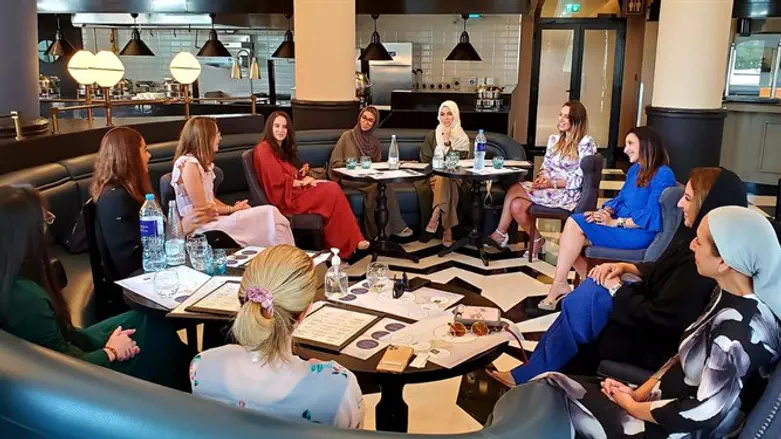
One year after the signing of the Abraham Peace Agreement between the UAE and Israel last September, it can be said that the two countries have successfully built a new regional strategic reality.
We are no longer talking about wars, confrontations and conflicts between the Arabs and Israel, but about the moment when the contract is completed and everyone is engaged in an atmosphere of peace that is taking hold day by day in our region. This is dispossessing the extremists of one of the most dangerous weapons they use to remain at the forefront of the regional landscape as actors capable of provoking tensions and igniting destabilizing violence.
We do not deny that when the agreement was first signed, many, especially in our region, questioned the intentions of the agreement. Others expected the agreement to enter into a deadlock, as with previous agreements signed between Israel and other Arab parties.
But what happened disappointed them all. The agreement was only a solid and firm foundation on which to build other political, economic, investment and commercial executive steps that have not ceased over the past year. To be sure, this is not just another protocol agreement or photo op stunt.
Sincere intentions and a solid foundation have been shared by both sides, the UAE and Israel, to build a real peace that benefits both.
Certainly, one of the reasons for the success of the Abraham Peace Agreement lies in the existence of common denominators between the two countries, both in terms of developmental ambition, pursuit of global competitiveness, and concern for the welfare and prosperity of the people.
All of these factors produce shared perceptions of the value of time and investing in opportunities in a way that serves the desired goals of both parties. The UAE has respected and appreciated Israel’s experience in technology, industry and information technology.
Israel sees the UAE as an example of ambitious and pioneering development that could help give a new impetus to its development. These commonalities accelerated understanding, convergence and cooperation and translated intentions into actions, agreements and cooperation protocols signed within the first days after the agreement.
The agreement was already a landmark moment, as described by former US President Donald Trump. Those who follow the atmosphere of Arab-Israeli relations from mid-September of last year until today, are aware of this. New life has been breathed into these relations.
There is a positive atmosphere that has begun to take effect and have a positive impact on everyone. No one can deny that the voices that tried to question the agreement and its motives have completely disappeared.
There is now a sort of collective awareness of the value of the historic proactive step taken by the UAE in search of a third way to end a historic conflict that caused serious strategic losses to all parties.
Those who play politics on the Palestinian Arab cause, alongside the extremism and terrorism organizations that seek to maintain the atmosphere of conflict and violence as the ideal environment for their activity and survival and to gain false legitimacy from slogans, feel weakened.
A year ago, several development sectors in the UAE and Israel made significant gains from the peace agreement.
Foremost among these are the technology and communications sectors, civil aviation, tourism and healthcare. These are fruits that benefit not only the two countries, but also other countries in the region as we look forward to historic breakthroughs in Arab-Israeli cooperation to achieve common interests or defend security that faces quite similar threats.
An important strategic gain is also related to spreading a culture of coexistence, tolerance and acceptance of the other. The more the atmosphere of confrontation, hostility and hatred recedes, the more the culture of peace expands and a better future begins for millions of young people seeking a tomorrow in which they realize their dreams and aspirations.
The UAE and Israel passed the credibility tests, embassies were opened in Abu Dhabi and Tel Aviv, and the peace agreement was transformed into a growing strategic lever for building a true regional axis of peace and cooperation between Arabs and Israel. The UAE-Israel peace agreement can indeed serve as a model for various forms of cooperation between the two sides.
Certainly, peace was not an emergency response to development but a strong desire to build a better future for future generations in our region than to think outside the box and seek realistic solutions to a distressed reality.
No one can deny that the UAE-Israel agreement has created a new climate in a region from which only violence, war and conflict were heard. The agreement has encouraged other Arab parties to move in the same direction and adopt the same approach.
There is real evidence of a common belief among all that peace is the only way to achieve a better future for our nations. All of these are pillars that establish a new regional reality based on cooperation, exchange of experiences and turning the page on many years of violence and bloodshed.
A few years ago, talk of an Emirati embassy in Israel and vice versa was political fiction.
But the UAE, with its ambitious leadership, which can look at the future from the point of view of national interests, understood the importance of building a model of normalization between Israel and its Arab neighbors, so that societies would feel the return of this cooperation, charting a new course to unlock the great potential of the region, which both sides already announced at the time of the signing of the historic agreement.
Dr. Salem AlKetbi is a UAE political analyst and former Federal National Council candidate.

